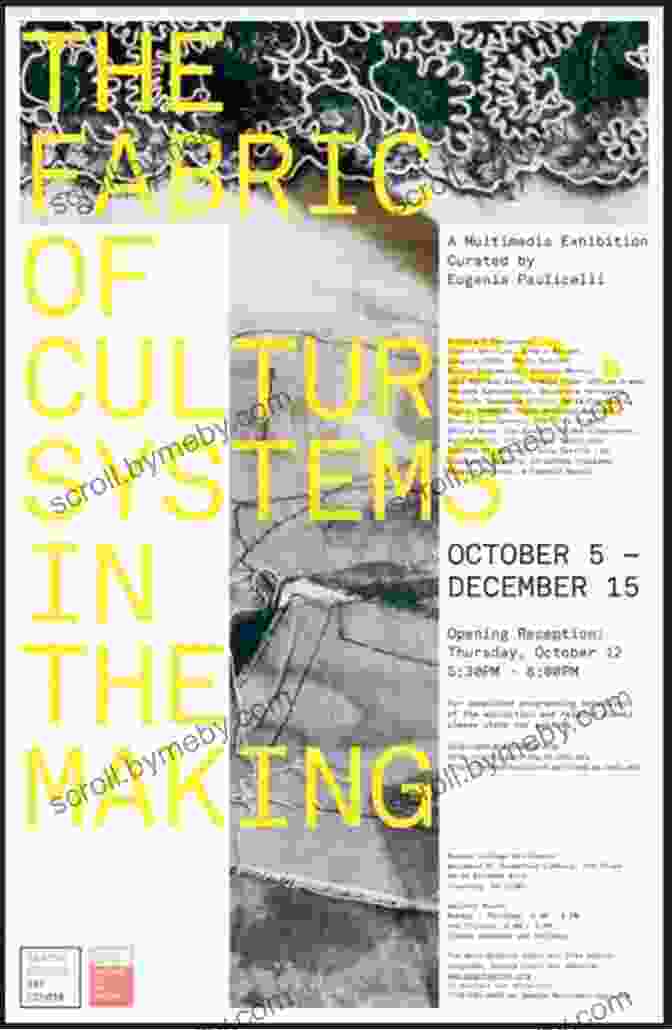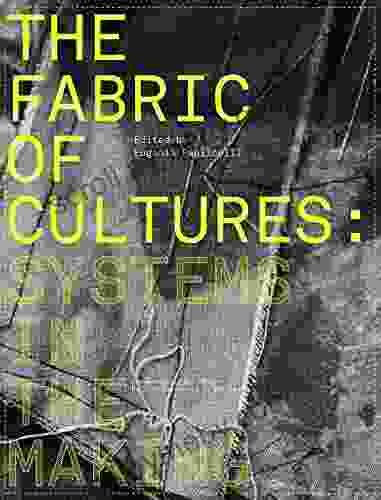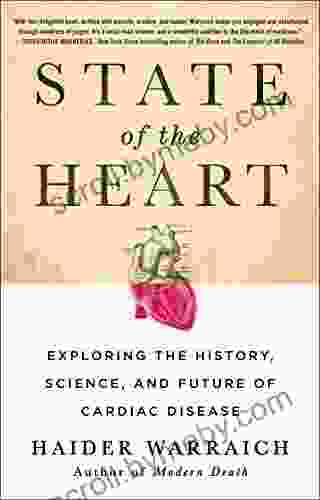Unveiling the Tapestry of Cultures: Systems Shaping the Fabric of Humanity


Culture, the intricate tapestry of beliefs, values, norms, and practices, serves as the foundation of human society. It shapes our identities, guides our behavior, and connects us to others. In his groundbreaking work, "The Fabric Of Cultures Systems In The Making," renowned anthropologist Prof. Dr. [Author's Name] presents a comprehensive exploration of the systems that shape and sustain cultural diversity.
5 out of 5
| Language | : | English |
| File size | : | 68910 KB |
| Screen Reader | : | Supported |
| Print length | : | 119 pages |
Through meticulous research and insightful analysis, this book delves into the intricate mechanisms that govern cultural development, transmission, and change. With a keen eye for detail and a profound understanding of human nature, Prof. Dr. [Author's Name] weaves together a compelling narrative that unveils the underlying architecture of societies around the world.
Cultural Systems: The Building Blocks of Society
At the heart of Prof. Dr. [Author's Name]'s analysis lies the concept of cultural systems. These systems, consisting of interdependent components, provide the framework for cultural expression and continuity. They encompass everything from language and religion to economic and political institutions.
Each component of a cultural system plays a vital role in shaping human experience. Norms, for example, define acceptable behavior, ensuring social Free Download and cooperation. Values, on the other hand, guide decision-making and influence moral judgments. Religion provides a sense of purpose and meaning, while economic systems govern the production and distribution of resources.
Emergence and Evolution of Cultural Systems
The development of cultural systems is a complex and dynamic process. Prof. Dr. [Author's Name] traces the origins of cultural diversity to the earliest human societies, examining how environmental factors, social interactions, and historical events have shaped the tapestry of cultures across the globe.
Cultural systems are not static but rather evolve over time, adapting to changing circumstances. Through a process of cultural diffusion, ideas and practices spread from one society to another, leading to the emergence of new cultural forms. Simultaneously, local conditions and experiences give rise to unique cultural adaptations that differentiate societies.
The Interplay of Systems: A Dance of Interdependence
Prof. Dr. [Author's Name] emphasizes the interconnectedness of cultural systems, highlighting how they interact and influence each other. The economic system, for instance, affects the distribution of wealth and power, which in turn shapes social stratification and political decision-making. Similarly, religious beliefs may influence economic practices and ethical values.
This interplay of systems creates a complex web of relationships that gives rise to the unique characteristics of each culture. By exploring these interconnections, Prof. Dr. [Author's Name] offers a nuanced understanding of the intricate dynamics that govern human societies.
Cultural Identity and the Individual
At the crossroads of cultural systems and human experience lies the concept of cultural identity. Our sense of self is deeply rooted in the culture we inhabit, shaping our worldview, aspirations, and sense of belonging.
Prof. Dr. [Author's Name] explores the multifaceted nature of cultural identity, examining how it is formed, maintained, and negotiated in different cultural contexts. He delves into the complexities of cross-cultural encounters, highlighting the challenges and opportunities that arise when individuals navigate multiple cultural systems.
Navigating Cultural Diversity: Challenges and Opportunities
In an increasingly interconnected world, understanding cultural diversity has become essential for successful interaction and collaboration. Prof. Dr. [Author's Name] provides practical insights into bridging cultural divides and fostering mutual respect.
One central challenge discussed in the book is ethnocentrism, the tendency to view one's own culture as superior to others. By promoting cultural relativism, the book encourages readers to appreciate the validity of different cultural perspectives, thereby fostering empathy and understanding.
Furthermore, Prof. Dr. [Author's Name] explores strategies for intercultural communication, emphasizing the importance of active listening, avoiding stereotypes, and seeking common ground. Through these techniques, individuals can effectively engage with people from diverse backgrounds and build bridges across cultural boundaries.
Preserving Cultural Heritage: A Legacy for Future Generations
Cultural heritage, the tangible and intangible expressions of a society's past and present, plays a crucial role in maintaining cultural identity and fostering a sense of belonging. Prof. Dr. [Author's Name] emphasizes the importance of safeguarding cultural heritage for future generations.
The book discusses various threats to cultural heritage, including globalization, urbanization, and environmental degradation. It also presents practical solutions for preserving cultural heritage, such as documentation, revitalization programs, and international cooperation.
"The Fabric Of Cultures Systems In The Making" by Prof. Dr. [Author's Name] is a tour de force that offers invaluable insights into the intricate systems that shape human culture. Through meticulous analysis and thought-provoking arguments, the book provides a comprehensive understanding of the emergence, evolution, and interplay of cultural systems.
By illuminating the interconnectedness of cultural components and the dynamic relationship between culture and the individual, this groundbreaking work empowers readers to navigate cultural diversity with empathy, understanding, and respect. It is an essential read for anyone interested in anthropology, sociology, cross-cultural communication, and the preservation of cultural heritage.
As we navigate the complexities of an increasingly interconnected world, "The Fabric Of Cultures Systems In The Making" serves as an indispensable guide for fostering intercultural understanding and building bridges across cultural divides. By embracing the tapestry of cultures that make up our shared humanity, we can create a more inclusive and harmonious world for generations to come.
5 out of 5
| Language | : | English |
| File size | : | 68910 KB |
| Screen Reader | : | Supported |
| Print length | : | 119 pages |
Do you want to contribute by writing guest posts on this blog?
Please contact us and send us a resume of previous articles that you have written.
 Book
Book Novel
Novel Page
Page Chapter
Chapter Text
Text Story
Story Genre
Genre Reader
Reader Library
Library Paperback
Paperback E-book
E-book Magazine
Magazine Newspaper
Newspaper Paragraph
Paragraph Sentence
Sentence Bookmark
Bookmark Shelf
Shelf Glossary
Glossary Bibliography
Bibliography Foreword
Foreword Preface
Preface Synopsis
Synopsis Annotation
Annotation Footnote
Footnote Manuscript
Manuscript Scroll
Scroll Codex
Codex Tome
Tome Bestseller
Bestseller Classics
Classics Library card
Library card Narrative
Narrative Biography
Biography Autobiography
Autobiography Memoir
Memoir Reference
Reference Encyclopedia
Encyclopedia Sonica Ellis
Sonica Ellis Cove Books
Cove Books Jane Watkins
Jane Watkins Clint Emerson
Clint Emerson Dennis Smith
Dennis Smith Greg Gifford
Greg Gifford Laurie Pfalzer
Laurie Pfalzer Colleen Hoover
Colleen Hoover Connie Malamed
Connie Malamed Stephanie Sarkis
Stephanie Sarkis Will Duffy
Will Duffy John Patrick Daly
John Patrick Daly Steven E Gutstein
Steven E Gutstein Craig Murray
Craig Murray Clive Hallett
Clive Hallett Daisy Farm Crafts
Daisy Farm Crafts Jason Runkel Sperling
Jason Runkel Sperling Peter Sanczel
Peter Sanczel Steven R Terrell
Steven R Terrell Cynthia A Robertson
Cynthia A Robertson
Light bulbAdvertise smarter! Our strategic ad space ensures maximum exposure. Reserve your spot today!

 Bill GrantPromises in the Dark: A Haunting Exploration of Secrets, Desire, and the Will...
Bill GrantPromises in the Dark: A Haunting Exploration of Secrets, Desire, and the Will...
 Jean BlairCelebrate the Spirit of Christmas with Rachel Campos Duffy's Heartfelt Book:...
Jean BlairCelebrate the Spirit of Christmas with Rachel Campos Duffy's Heartfelt Book:... Jacob FosterFollow ·3.6k
Jacob FosterFollow ·3.6k Bob CooperFollow ·16.1k
Bob CooperFollow ·16.1k Ernesto SabatoFollow ·6.9k
Ernesto SabatoFollow ·6.9k Eugene ScottFollow ·2.1k
Eugene ScottFollow ·2.1k George HayesFollow ·19.8k
George HayesFollow ·19.8k Francis TurnerFollow ·7.4k
Francis TurnerFollow ·7.4k Camden MitchellFollow ·7.2k
Camden MitchellFollow ·7.2k Tony CarterFollow ·2.2k
Tony CarterFollow ·2.2k

 Cruz Simmons
Cruz SimmonsUnveiling the Secrets: An Insider Guide to School Bonds...
Unlock the Power of School...

 Gil Turner
Gil TurnerRuins of Empire: Blood on the Stars - The Epic Space...
Ruins of Empire: Blood on the Stars is the...

 Allen Ginsberg
Allen GinsbergPrepare for the Ultimate Space Opera: Delve into The Last...
Embark on an...

 Anton Foster
Anton FosterUnleash Your Inner Artist: The Ultimate Guide to Oil...
Chapter 1: The...
5 out of 5
| Language | : | English |
| File size | : | 68910 KB |
| Screen Reader | : | Supported |
| Print length | : | 119 pages |












